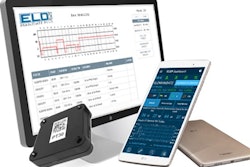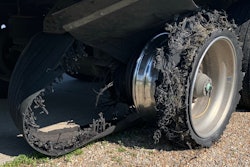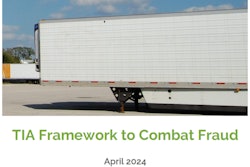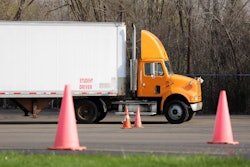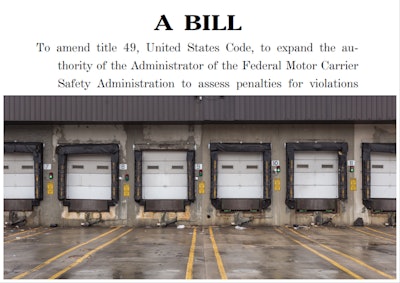
A bipartisan pair of lawmakers on Wednesday introduced a bill that would empower the Federal Motor Carrier Safety Administration to impose $10,000 civil penalties on registered entities that violate its commercial regulations.
The title of the bill, the Household Goods Shipping Consumer Protection Act, references the consumer-facing HHG trucking niche, but the legislation has big implications for all registered carriers and brokers and the load boards on which they connect.
Importantly, the bill seems to echo calls from anti-freight fraud crusaders: Enforce the rules on the books and actually penalize bad actors.
Currently, a 2019 Department of Transportation Administrative Law Judge ruling means FMCSA lacks authority to assess civil penalties for violations of commercial regulations and registration requirements, though they are indeed codified regulations.
If the bill is passed and ultimately signed into law, carriers brokering loads without broker authority would be subject to the fines. The legislation could enable FMCSA to more readily block or revoke the authority of carriers or brokers/forwarders without a proper principal place of business address (sometimes a hallmark of scam operations). Registrants also would be required to disclose ties to other operations or face the same $10,000 penalty.

The bill was Introduced by Congresswoman Eleanor Holmes Norton (D-D.C.) and Congressman Mike Ezell (R-Mississippi), with a broad cross section of trucking support. The Commercial Vehicle Safety Alliance, the Owner-Operator Independent Drivers Association, the Transportation Intermediaries Association, the National Association of Small Trucking Companies, American Trucking Associations' HHG-focused conference, and the Institute for Safer Trucking all expressed measures of support.
Under the bill's provisions, which amend Title 49 of the U.S. Code, not only could FMCSA fine double brokers $10,000, but the agency would gain explicit authority to withhold registration from any applicant who fails to provide a valid principal place of business at the time of registration. Currently, FMCSA can only take action on existing entities that fail to cooperate with investigations at the designated address.
The bill defines a valid principal place of business (PPOB) as "a single physical business location of a specified entity where management officials of such specified entity report to work; such specified entity conducts a significant portion of its business relating to the transportation of persons or property; and such specified entity maintains records."
In short, no more UPS stores, empty parking lots or so-called "virtual office" addresses that have sometimes served as PPOBs for fake carriers or other double brokering entities. The push against improper PPOBs tracks with FMCSA's own reform efforts, including a massive overhaul of its registration system and the end of MC numbers.
[Related: FMCSA to end MC numbers, overhaul registration system to stamp out fraud]
The bill would enable FMCSA to "withhold, suspend, amend, or revoke any part of a registration of a motor carrier, foreign motor carrier, foreign motor private carrier, broker, or freight forwarder" if they "failed to designate a valid principal place of business."
Additionally, any broker or freight forwarder would need to disclose its connections to other regulated entities. This part takes aim at major double brokers with dozens of MC numbers triple or quadruple brokering loads.
Section 13904(a) of Title 49, under the bill's terms, would require any broker to disclose "any relationship involving common ownership, common management, common control, or common familial relationship between such person and any other motor carrier, freight forwarder, or broker, or any other applicant for motor carrier, freight forwarder, or broker registration, if the relationship occurred in the 3-year period preceding the date of the filing of the application for registration."
TIA vocally supported and helped craft the legislation after outcry from its members that the scourge of double brokering has done serious reputational damage to the industry.
[Related: 'We're hemorrhaging money': Big brokers, shippers feel the heat from double brokers]
"We wanted to kind of put FMCSA's feet to the fire in enforcing the regs," said Chris Burroughs, VP of government affairs at TIA. Just days ago, "we had a member reach out and say that a fraudulent carrier was using their physical address. They said, 'we have no idea who they are and we're the only tenants of this building.'"
If someone has "37 different trucking companies and licenses, that should raise a red flag," he added, speaking to the push to address commonality in registrations.
Anne Reinke, president & CEO of TIA, made it clear that brokers worry about fraud harming their image. “Fraudulent activities not only cause significant financial losses but also undermine public trust in institutions and markets," she said in a statement. "By implementing these strong anti-fraud laws, our government can ensure a more stable and predictable economic environment, which is essential for sustainable growth and investment.”
David Owen, NASTC president, noted "this bedeviling [fraud] epidemic continues to plague the trucking industry," signaling wholehearted support for the new bill. "It takes steps to ensure that fraudulent brokering by criminals and criminal enterprises gets caught and held accountable." The focus on PPOBs, he added, "should help disrupt the many frauds who exploit the ability to run and constantly shift their brokering fraud schemes solely online. NASTC looks forward to working with these lawmakers to move this bill forward."
An OOIDA statement emphasized the sting to motor carriers "victimized through unpaid claims, unpaid loads, double brokered loads, or load phishing schemes on a daily basis," saying the fraud problem costs the trucking industry more than $800 million annually.
"Freight fraud committed by criminals and scam artists has been devastating to many small business truckers simply trying to make a living in a tough freight market,” said OOIDA President Todd Spencer. “OOIDA and the 150,000 small-business truckers we represent applaud Representative Holmes Norton and Representative Ezell for their bipartisan leadership to provide FMCSA better tools to root out fraudulent actors, which are also harmful to consumers and highway safety. Because of the broad industry support for these commonsense reforms, we hope this bipartisan legislation will move through the Transportation and Infrastructure Committee without delay.”
[Related: The double brokering slow burn: How it happens, and how to fight back against it]

